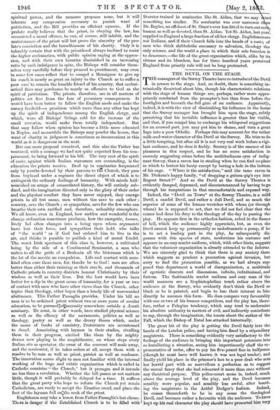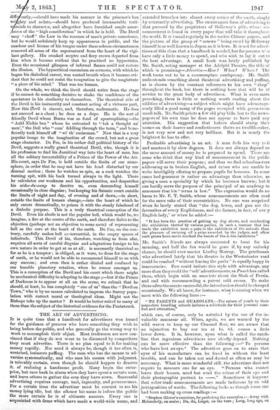THE DEVIL ON THE STAGE.
HE managers of the Surrey Theatre have re-introduced the Devil T
in person to the stage. And, no doubt, there is something in- trinsically theatrical about him, though his characteristic relations with the stage of human things are, perhaps, rather more appro- priately conducted from the prompter's box than from before the footlights and beneath the full gaze of an audience. Apparently? indeed, it is with the view of diminishing his influence in the house that the Surrey manager has brought him upon the stage, subtly perceiving that his invisible influence is greater than his visible, and that, if you compel him to exchange his whispered suggestions for an avowed part, you may put him to shame, and turn a great Iago into a poor Othello. Perhaps this may account for the rather milk-and-water character of the Devil at the Surrey. He tries to do a little tempting, but after all it is not very real work before a vigi- lant audience, and he does it feebly. Secrecy is of the essence of his pleasures in this respect, and he has no more satisfaction in coarsely suggesting crime before the multitudinous eyes of indig- nant Surrey, than a raven has in stealing when he can find no place in which to bestow his booty except by boring a hole in the bottom of his cage. " Where is the satisfaction," said the tame raven in Mr. Dickens's happy family, "of dropping a guinea-pig's eye into Regent Street?" And so the Devil at the Surrey Theatre is evidently damped, depressed, and discountenanced by having to go, through his temptations in that uncomfortable and exposed way.
Indeed, the "Devil on Town" at the Surrey Theatre, is a mild. Devil, a candid Devil, and rather a dull Devil, and so much the superior of some of the human wretches with whom (or through whom) he is supposed to act, that we did not feel clear that the censor had done his duty to the theology of the day in passing the play. He appears first in the orthodox fashion, robed in the flames of hell, which the audience highly appreciate, but, as even the Devil cannot keep up permanently so melodramatic a pomp, if he is to net a leading part in the play, he subsequently dis- penses with this species of state, modernizes his costume and appears in an easy scarlet uniform, which, with other hints, suggests that the volunteer organization is already extended to the Inferno. We are sincerely glad to think that there is any anxiety there which suggests so prudent a precaution against invasion, but sorry to find the precaution possible, as we had always sup- posed that department a world of disorganization, a multitude of egotistic dissents and dissensions, infinite, infinitesimal, and furious. The fashionable scarlet uniform and easy man of the world manners are a Ilephistophelian touch rather above the audience at the Surrey, who evidently don't think the Devil so black as he is painted, and begin to lose their interest in him directly he assumes this form. He does compare very favourably with one or two of his human competitors, and the play has, there- fore, rather a Pelagian tendency, which may tend to undermine his absolute authority in matters of evil, and indirectly contribute to sap, through the imagination, the tenets about the author of the Fall, which the Bishop of Natal has attacked historically.
The great hit of the play is getting the Devil fairly into the hands of the London police, and having him fined by a stipendiary magistrate. There is something evidently very satisfactory to the feelings of the audience in bringing this important potentate into so humiliating a situation, seeing him impertinently chaff the re- presentative of order, offer to pay his five-pound fine in halfpence (though he must have well known it was not legal tender), and finally yield his place in the prisoner's box to a poor drab who acts her horrid part with so marvellous a perfection as to suggest the unreal fancy that she had rehearsed it more than once without any theatrical purpose. This police-court scene is, indeed, much above the average level of the play, and the Devil becomes sensibly more popular, and sensibly less awful, after beard- ing the magistrate in the Artful Dodger's fashion. Indeed, he ceases thenceforth to be in any sense the theological Devil, and becomes rather a favourite with the audience. To have kept up his real character the play should have presented him very
diffe ently,-should have made his manner in the prisoner's box we 0-hty and sedate,—should have produced innumerable testi-
°Dials to character, and altogether have furnished ample assur-
nces of the " high consideration" in which he is held. The Devil / may " chaff " the Law in the recesses of man's private conscience, but he would sedulously keep up appearances in public, and the candour and license of his tongue under these solemn circumstances removed all sense of the supernatural from the heart of the vigi- lant gallery. His crooked sceptre and fiery crown departed from him when it became evident that he practised no hypocrisies. Even the occasional glimpses of infernal flames could not restore the illusion. The hypocritical encomium on sermons, with which he began his diabolical career, was wasted breath when it became evi- dent that he could not resist the temptation to give the magistrate " a piece of his mind." That was too human.
On the whole, we think the Devil should retire from the stage if he cannot do something decisive to shake the confidence of the spectators in his similarity to themselves. The theatrical side of the Devil is his insincerity and constant acting of a virtuous part: Now this ',evil is sincere, and, therefore, undramatic. He does not succeed as a cheat ; he does as a dupe. He is the sort of friendly Devil whom Burns was so fond of apostrophizing—the " Auld Nickie ben" whom he entreated to " tak a thought an' men'," the Deil who " cam' fiddling through the toun," and bene- ficently took himself off " wi' th' exciseman." Now that is a very popular image to the imagination of the crowd, but not a great stage character. De Foe, in his rather dull political history of the Devil, suggests a really grand theatrical Devil, who, though it is his profession to find his Jesuitical way into the heart of man, has all the solitary immutability of a Prince of the Power of the Air. His court, says De Foe, is held outside the limits of our atmo- sphere, in order that he may not have his head disturbed by our diurnal motion ; there he watches us spin, as a cook watches the turning spit, with his back turned always to the light. There he calculates our weakness and his opportunities, and despatches his aides-du-camp to deceive us, even descending himself occasionally inclose disguise; but keeping his Satanic court outside the limits of night and day, of evening and of dawn,—in short, outside the limits of human change,—into the heart of which he only enters dramatically, to poison it with the steady falsehood of a diabolic purpose. This is a truly theatrical conception of the Devil. Even his abode is not the popular hell, which would be, we imagine, a fire at the centre of the earth, and therefore liable to the objection (perhaps not an objection to some sects) of representing hell as the core at the heart of the earth. De Foe, on the con- trary, carefully makes hell ex-terrestrial, in the empty spaces of infinitude. This Devil of his, therefore, watching us from afar, requires all sorts of careful disguise and adaptations foreign to his own nature in order to get at us at all; is necessarily theatrical so far as he is a tempter ; is obliged, as it were, to dress for the stage of earth, or he would not be able to recommend himself to us with any success ; and even then is rather dizzied and confused by our humble planetary rotation, when he comes amongst us. This is a conception of the Devil and his court which there might be mechanical difficulty in adapting to the stage ;—but if the Prince of Darkness is to appear at all on the scene, we submit that he should, at least, be less completely " one of us" than the " Devil on Town," who is by no means calculated to impress the Surrey popu- lation with correct moral or theological ideas. Might not the Bishops take up the matter ? It would be better suited to many of them than the subject of the historical evidence for the Pentateuch.































 Previous page
Previous page